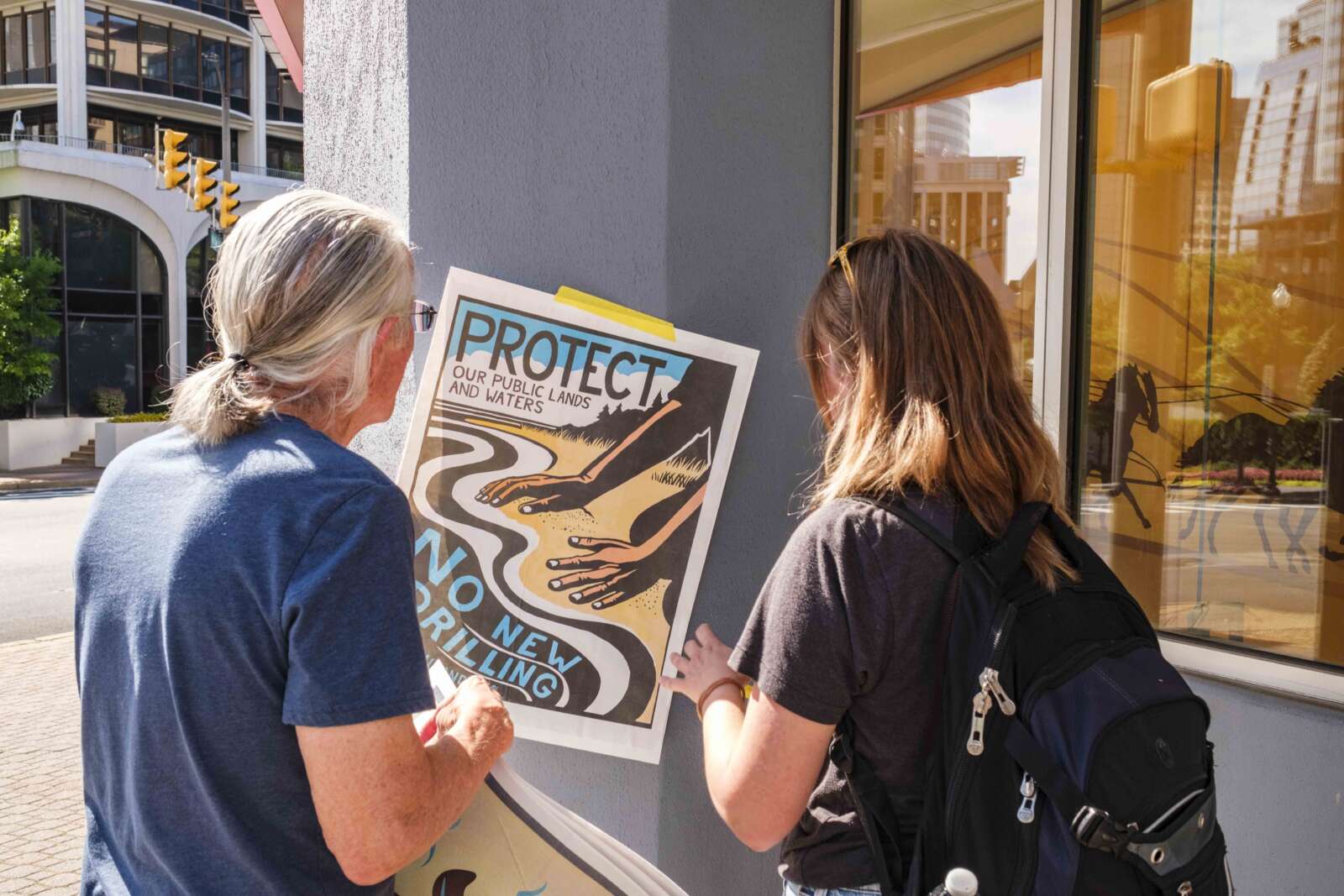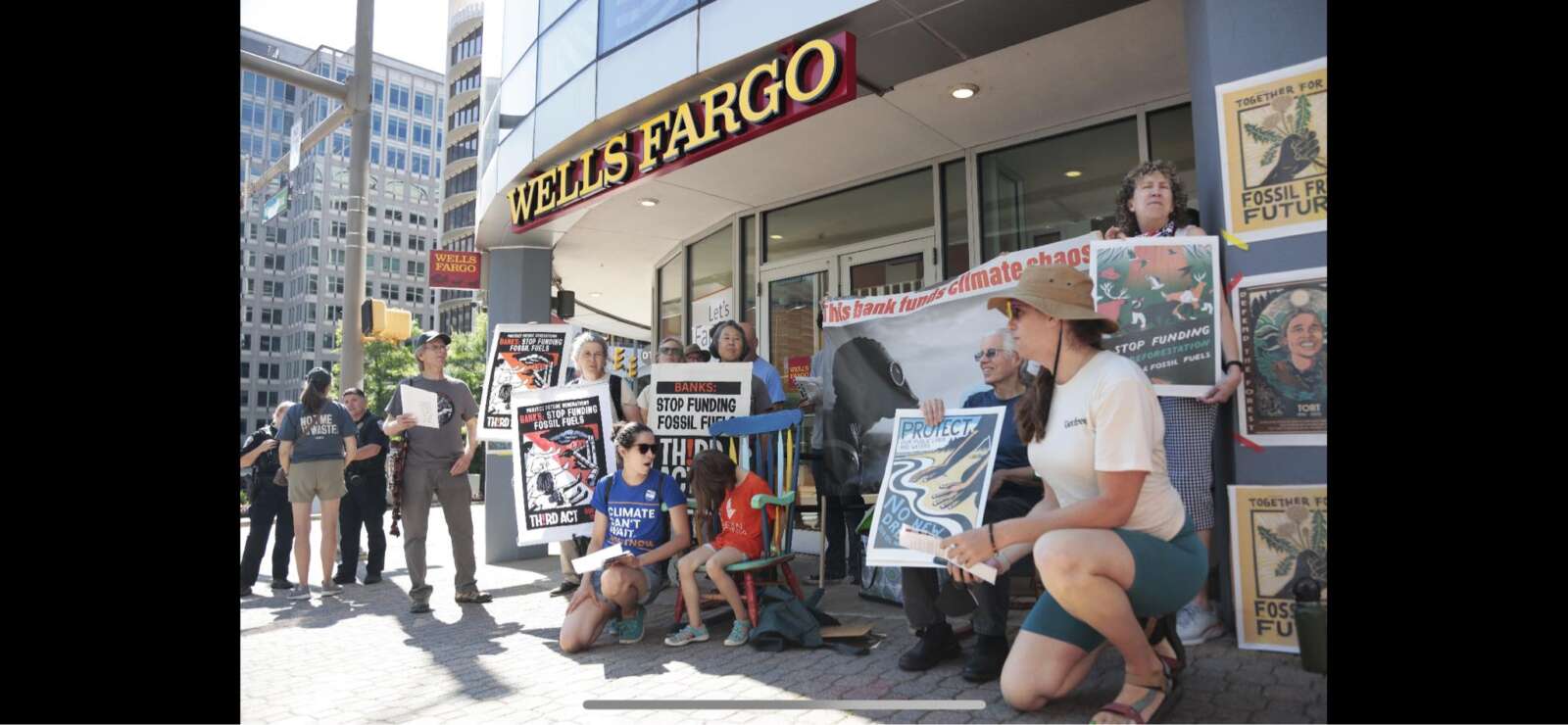A climate change protest temporarily shut down a Rosslyn bank this morning.
The relatively small demonstration drew a handful of older protests and a few of grad-school age to the Wells Fargo at 1500 Wilson Blvd.
The organizers, ThirdAct Virginia, touted it as a protest of elders demanding climate action alongside youth climate activists. It featured rocking chairs outside the bank and a sit-in inside. Just over a dozen people participated, most of them older.
The issue, according to organizers, is Wells Fargo’s role in the Mountain Valley Pipeline, a planned 300-mile natural gas pipeline which would run through parts of Virginia. Construction on the pipeline was again halted by a federal court this week, despite being fast-tracked by Congress in the recent debt limit deal.
More on the protest, below, from a ThirdAct Virginia press release.
Members of ThirdAct Virginia, elders demanding climate action, and youth climate activists shut down an Arlington branch of Wells Fargo, disrupting business by staging a sit-in inside and protesting outside.
The multi-generational group, some sitting in rocking chairs outside the bank, sang songs and chanted, and waved signs and banners, demanding that the bank stop funding new fossil fuel projects including the contested Mountain Valley Pipeline that cuts across the mountains of southern Appalachia in West Virginia and Virginia.
The Friday protest is part of a series of actions across the country against the big four dirty banks (Wells Fargo, Chase, Bank of America, and Citibank) that are the worst offenders, continuing to finance billions of dollars in new fossil fuel projects, despite surging climate disasters. A large public protest with art, music and dance is planned for later in the day outside Wells Fargo headquarters in San Francisco.
The July 14 protests are timed to coincide with the announcement Friday of the bank’s 2023 second quarter earnings results.
The Virginia action was planned using a new Beginners Guide to Disrupting Climate-Bad Banks. The guide describes “why autonomous non-violent direct action is crucial and how to organize such actions.” Organizers of the Virginia event said they hoped that others around the country will use the guide to plan similar actions.
Wells Fargo has “invested” over $316 billion in fossil fuels since 2016, making it the third largest funder of the industry in the world, as well as the number one funder of fracking.
Wells Fargo is also the #1 investor in the Mountain Valley Pipeline (MVP) that is being built in Appalachia (starting in West Virginia and ending in Virginia) spanning 300 miles through steep mountain ranges, crossing more than 100 streams, and running through the middle of old growth forests.
Not only is this pipeline already ruining the wells and land of the people that live there, if completed it will result in annual emissions of over 89 million metric tons of carbon dioxide equivalent. This would be like adding 26 coal plants or 19 million passenger vehicles. […]
Lisa Finn, a co-organizer of ThirdAct Virginia, said: “We are here today to demand that Wells Fargo stop financing new fossil fuels, including the dangerous and unnecessary Mountain Valley Pipeline. Wells Fargo says that they are committed to a sustainable future. As long as they keep funding the MVP and other new fossil fuel projects, this is clearly a lie.”
Bob Durkin, a recently retired physician said: “As a lung doctor, I became frustrated with the number of people I saw getting sick or dying as a result of air pollution and global warming. Studies show that one out of five deaths around the world are due to air pollution and climate change.”
“It’s ridiculous that Wells Fargo is continuing to fund new fossil fuel projects. With all the recent fires and floods, I’ve reached the point where I’m decided to join in efforts to disrupt their destructive business as usual,” he said.
Third Act works to create a fairer, more sustainable society and planet by exercising the political and economic power of older folks. 70% of all wealth in the U.S. is held by older Americans. Third Act uses this privilege for the good of all, from Washington to Wall Street and beyond.






